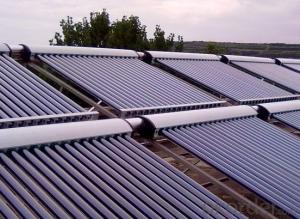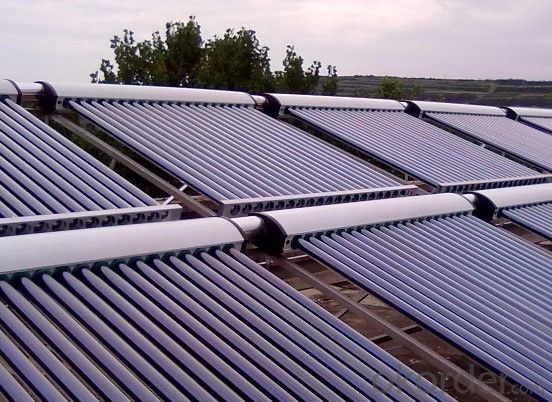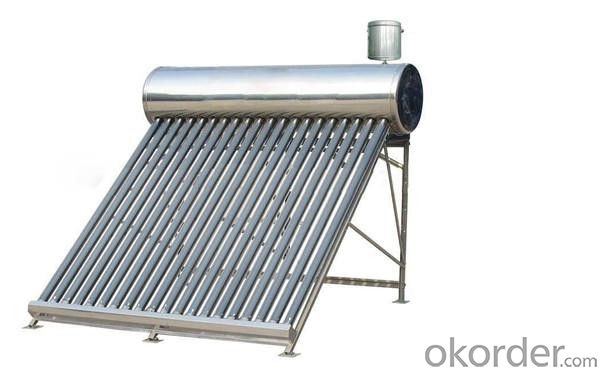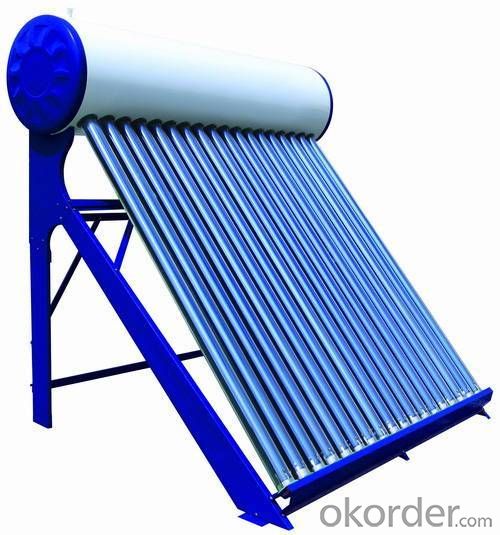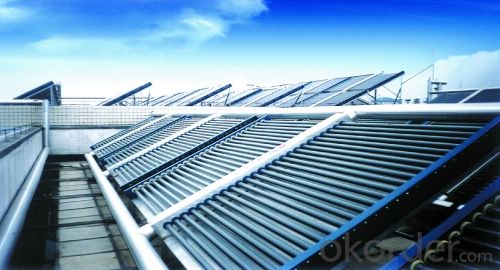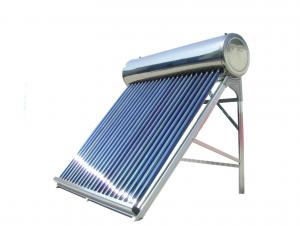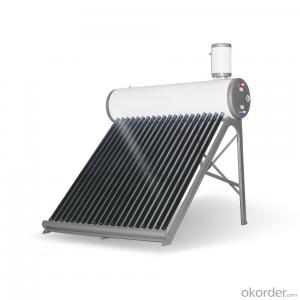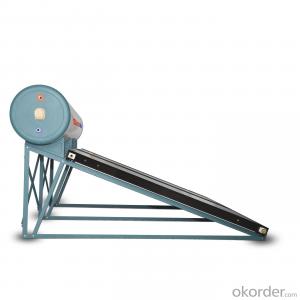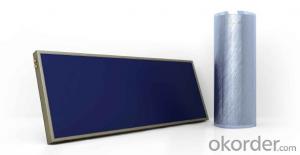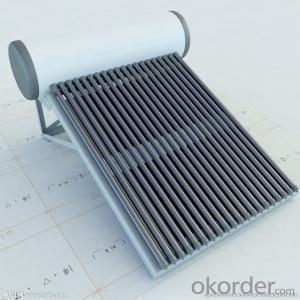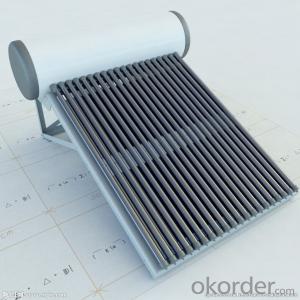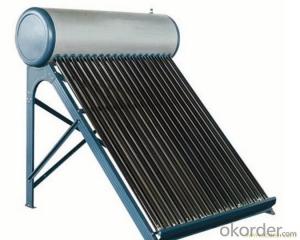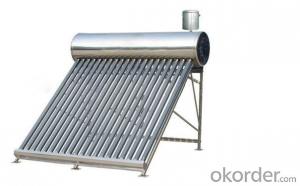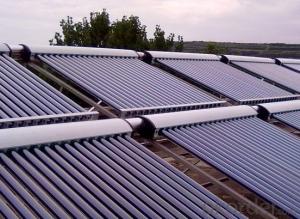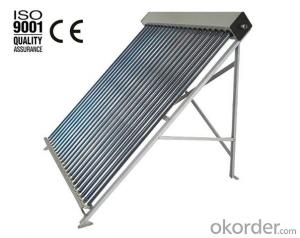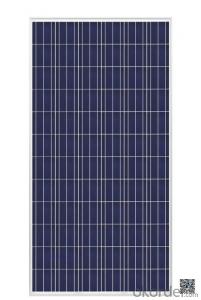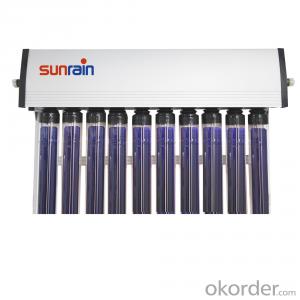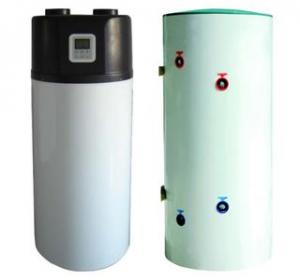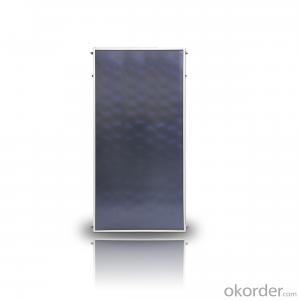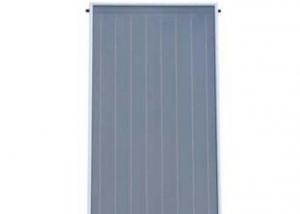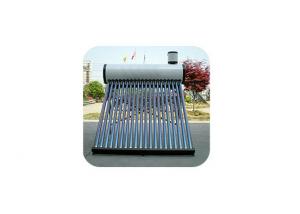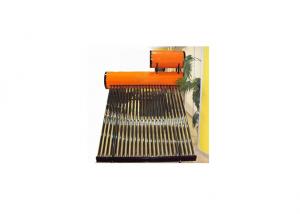Solar Water Heater Panels for Pools - Vacuum Tube Solar Collector Supplier in China
- Loading Port:
- China main port
- Payment Terms:
- TT OR LC
- Min Order Qty:
- 10 set
- Supply Capability:
- 10000 set/month
OKorder Service Pledge
OKorder Financial Service
You Might Also Like
Solar water heaters features
1. The upright tank can make the water temperature to a high level. It can hot the water instantly
2. The tank inside the building, the hot water loses less energy than the normal one
3. The solar collector and the tank of solar water heater is separated, that makes the system combine with the building perfectly, which will reduce the sightseeing for the building and environment around
4. Back up with electric heater so that in the day without sunshine hot water can also be used
5. Can be combined with gas or electric heater
6. Max. Pressure: 12bar; Operating Pressure: 6 bar
7. It can be used for other function, such as warming
Solar water heaters working principle
1. The solar collector absorbs solar energy and transmits it to the solar water heater tank through circulation
2. When the temperature of the collector reaches the set value, the controller starts the circulation pump automatically
3. The circulation pump makes heat-conducting liquid circulate automatically
4. The heat-conducting liquid transfers heat to water by lower heat exchanger in the water tank.
5. When the temperature difference between solar collector and heat pipe solar water heaters tank doesn't reach the set value, the circulation pump will be shut automatically
6. In case the temperature of the water tank does not reach Tmax, Electric Heating Element will start to work automatically
Solar water heaters working station component:
1. Operating screen
2. Manometer
3. Pump speed adjust switches
4. Temperature difference circulation pump
5. Flow rate indicator
6. Return circuit connector
7. Safety valve
8. Expansion vessel connector9. Return circuit connector
10. Wall mounting
11. Expansion vessel:8L
12. Pressure resistance: 10 bar pressure for expansion vessel
Solar water heaters specification:
Description | solar water heaters |
Material of out manifold | 0.55mm thickness color steel/ fluorine carbon steel |
Material of inner tank | Food grade 2.0 mm thickness SUS304 stainless steel |
Tank insulating layer | 40mm 45kg/m³ high-density polyurethane foamed |
Inlet and outlet hole | Male G1'' |
Max pressure | 0.6 Mpa |
Solar collector tube | 3.3 Borosilicate glass with N/Al coating |
Thickness of glass tube | 1.6mm |
Vacuum tube tightness | P≤0.005 Pa |
Absorption | as=0.93-0.96 (AM1.5) |
Emission ratio | εh=0.04-0.06 (80C±5C) |
Idle sunning property parameters | Y=220~260m2.C/KW |
Average heat loss coefficient | ULT=0.6~0.7W/(m2.C) |
Bracket: | 2.0mm thickness aluminum alloy |
Tank weight | 75KGS |
Tank size | 560mm Dia x 1810mm Height |
Tank capacity | 300L |
Solar collector | 2pcs 58x1800x15tube solar collector |
Absorber area | 2.811 m² |
Working station | SP116 working station |
Heat exchanger length | Upper:12m, Underside:18m |
Solar water heaters details show:
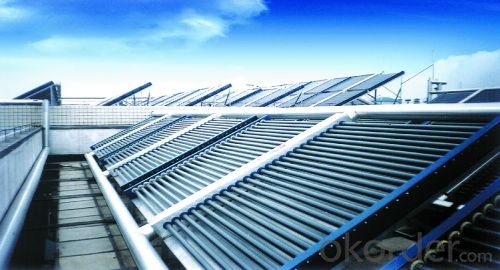
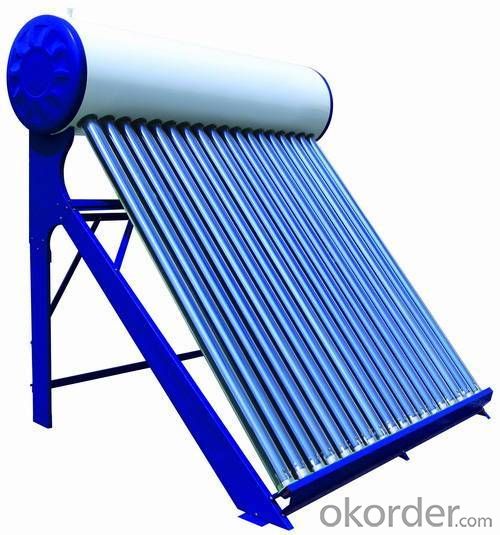
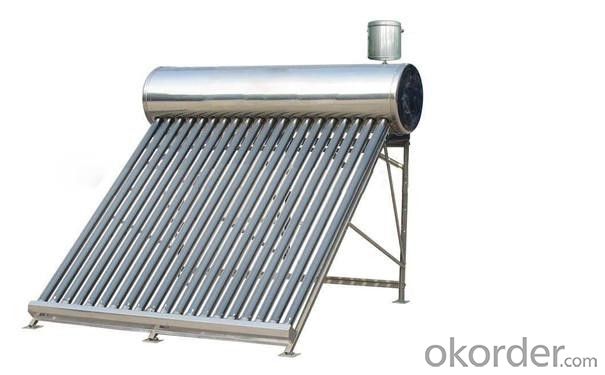
Benefits of this kind of solar water heaters:
1. Prolong the life of your existing water heater
2.Costs less than an electric, gas or oil water heater
3.No maintenance required
4.Lasts longer than a traditional hot water heater
5.Reduce your water heating costs
- Q: How does the size of a solar water heater affect its performance?
- The size of a solar water heater directly affects its performance. A larger solar water heater will typically have a greater surface area for collecting sunlight, resulting in more energy being absorbed and transferred to the water. This means that a larger solar water heater can generate more hot water and have a higher heat output compared to a smaller one. However, it is important to ensure that the size is appropriate for the household's hot water demand to optimize the system's efficiency and avoid unnecessary oversizing.
- Q: What is the impact of bird or animal damage on the performance of a solar water heater?
- Bird or animal damage can have a significant impact on the performance of a solar water heater. One of the most common issues caused by these damages is the obstruction of the solar panels or collectors. Birds may build nests or leave droppings on the panels, blocking sunlight from reaching the solar cells and reducing the overall efficiency of the system. Additionally, animals such as squirrels or rodents may chew on the wires or cables connecting the solar water heater to the storage tank or control systems. This can lead to electrical shorts or open circuits, disrupting the flow of electricity and preventing the heater from functioning properly. Moreover, animals may also damage the insulation surrounding the pipes or tubing of the solar water heater. This can result in heat loss and reduced efficiency as the heated water may not reach the desired temperature or may cool down faster during transportation. Furthermore, bird or animal damage can lead to clogging or blockages in the water supply or drainage pipes. Nesting materials, debris, or even carcasses can accumulate in these pipes, hindering the flow of water and potentially causing leaks or backups. In summary, bird or animal damage on a solar water heater can impede the system's performance by obstructing sunlight, damaging electrical components, reducing insulation efficiency, and causing clogs in the water supply or drainage pipes. Timely maintenance and protective measures, such as installing bird or animal deterrents, can help mitigate these impacts and ensure optimal performance of the solar water heater.
- Q: How often does a solar water heater need maintenance?
- A solar water heater typically requires maintenance once or twice a year to ensure optimal performance and longevity.
- Q: How does a solar water heater perform during winter months?
- A solar water heater typically performs less efficiently during winter months due to decreased sunlight and colder temperatures. However, modern solar water heaters are designed with advanced insulation and freeze protection mechanisms to optimize performance in colder climates.
- Q: Can a solar water heater be used in areas with limited access to water conservation measures?
- Yes, a solar water heater can still be used in areas with limited access to water conservation measures. While water conservation measures are important for maximizing the efficiency and effectiveness of a solar water heater, the primary function of a solar water heater is to use the sun's energy to heat water. Therefore, even in areas with limited access to water conservation measures, a solar water heater can still be used to heat water using renewable energy. However, it is important to implement water-saving practices whenever possible to optimize the benefits of a solar water heater.
- Q: How does the water hardness affect the performance of a solar water heater?
- Water hardness can have both positive and negative effects on the performance of a solar water heater. Hard water is characterized by high mineral content, specifically calcium and magnesium ions, which can lead to various issues in the system. One major impact of water hardness on a solar water heater is the formation of scale or mineral deposits. As hard water is heated, the minerals can precipitate and form a layer of scale on the heat exchanger or the inner walls of the tank. This reduces the efficiency of the heater by insulating the heat transfer surfaces, making it harder for the solar energy to be absorbed and transferred to the water. The build-up of scale can also restrict the flow of water, reducing the overall performance and potentially causing damage to the system. Furthermore, the accumulation of scale can lead to the corrosion of metal components within the solar water heater. The minerals in hard water can react with the metal surfaces, causing them to deteriorate over time. This corrosion can weaken the structural integrity of the system and may result in leaks or other malfunctions. On the other hand, the presence of minerals in hard water can also act as a heat conductor, enhancing the thermal performance of the solar water heater. The minerals in the water can help in absorbing and retaining heat, thus providing a slight boost to the heating efficiency of the system. To mitigate the negative effects of water hardness on the performance of a solar water heater, it is recommended to use a water softener or install a water treatment system that can remove or reduce the mineral content. Regular maintenance and cleaning of the system, including descaling, are also crucial to ensuring optimal performance.
- Q: Are there any fire hazards associated with using a solar water heater?
- No, there are generally no fire hazards associated with using a solar water heater as it operates using solar energy and does not involve any combustion or flammable substances.
- Q: Can a solar water heater be used in areas with limited hydrogen fuel cell resources?
- Yes, a solar water heater can be used in areas with limited hydrogen fuel cell resources. Solar water heaters utilize the energy from the sun to heat water, eliminating the need for hydrogen fuel cells. Therefore, they offer a viable and sustainable alternative for heating water in regions where hydrogen fuel cell resources are scarce or unavailable.
- Q: Can a solar water heater be used in areas with wildlife or pest issues?
- Yes, a solar water heater can be used in areas with wildlife or pest issues. However, it is important to take certain precautions to protect the system from any potential damage caused by wildlife or pests. This can be done by installing fencing or barriers around the solar water heater to deter animals, using secure lids or covers for storage tanks, or implementing regular maintenance and inspections to identify and address any issues promptly.
- Q: Are there any government incentives for installing a solar water heater?
- Yes, there are government incentives for installing a solar water heater. These incentives vary by country and region, but they typically include tax credits, grants, rebates, or low-interest loans to help offset the cost of installation. Additionally, some governments may offer feed-in tariffs or net metering programs, allowing homeowners to earn credits or sell excess solar energy back to the grid. It is advisable to check with local government agencies or energy authorities to determine the specific incentives available in your area.
Send your message to us
Solar Water Heater Panels for Pools - Vacuum Tube Solar Collector Supplier in China
- Loading Port:
- China main port
- Payment Terms:
- TT OR LC
- Min Order Qty:
- 10 set
- Supply Capability:
- 10000 set/month
OKorder Service Pledge
OKorder Financial Service
Similar products
Hot products
Hot Searches
Related keywords
